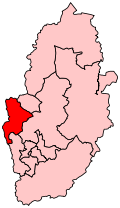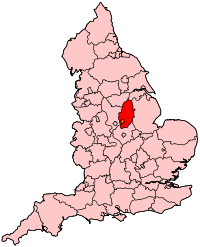1977 Ashfield by-election
The Ashfield by-election was held on 28 April 1977 in the Ashfield constituency in the coal mining area of Nottinghamshire, following the resignation of Labour Member of Parliament David Marquand. Conservative candidate Tim Smith was the narrow winner in what was thought to have been a very safe Labour seat.
| Ashfield constituency | |
|---|---|
  | |
| Ashfield shown within Nottinghamshire, and Nottinghamshire shown within England | |
Marquand had resigned to take up a post at the European Commission in Brussels, as an advisor to the United Kingdom's newly appointed Commissioner Roy Jenkins. His majority at the October 1974 general election had been 22,915 votes,[1] which made the seat look very safe.
There was another by-election held on the same day, in Tony Crosland's nearby former seat of Grimsby which looked much more marginal. Crosland had died on 19 February 1977. The Labour Party directed most of its campaign effort into saving Grimsby, believing Ashfield was in no danger. This strategy succeeded in saving Grimsby, but allowed Tim Smith to win by 264 votes[2] (after a recount) over Labour's Michael Cowan.
The results in both Grimsby and Ashfield were seen as a surprise as they were the opposite of what had been expected. Though both contests saw a swing to the Conservatives, the swing in Grimsby was only 7% as opposed to almost 21% in Ashfield.[3] Labour Cabinet Minister Roy Hattersley was reported to be "almost speechless" at the by election results which were announced at 02:00 the next day, while Conservative leader Margaret Thatcher stated that "This is one of the greatest by-election victories of all time."[3]
The Liberal Party lost its deposit in Ashfield as well as in the Grimsby contest, the third time this had happened at by-election following the 1977 Lib-Lab Pact. These results were described as "devastating" for the Liberal leader David Steel.[3]
Smith was unable to hold the seat at the 1979 general election, when Labour's Frank Haynes won with a majority of 7,797 votes. He was one of only five Conservative MPs to lose their seats at that election, four of whom had been by-election victors. Smith did however return to Parliament at another by-election three years later in Beaconsfield, Buckinghamshire (in which his Labour opponent was future Prime Minister Tony Blair) and would serve in that seat for 15 years. He was forced to stand down as an MP in 1997 when the cash for questions scandal disgraced him.
Results
| Party | Candidate | Votes | % | ± | |
|---|---|---|---|---|---|
| Conservative | Tim Smith | 19,616 | 43.1 | +20.3 | |
| Labour | Michael Cowan | 19,352 | 42.5 | -20.2 | |
| Liberal | Hampton Flint | 4,380 | 9.6 | -4.7 | |
| National Front | George Herrod | 1,734 | 3.8 | ||
| Socialist Workers | June Hall | 453 | 1.0 | ||
| Majority | 264 | 0.6 | |||
| Conservative gain from Labour | Swing | 20.8 | |||
References
- UK general election results, October 1974: Aberavon — Banbury at Richard Kimber's Political Science Resources
- "1977 By Election Results". Archived from the original on 12 October 2013. Retrieved 17 September 2015.
- Parkhouse, Geoffrey (29 April 1977). "Sensation at the polls". The Glasgow Herald. p. 1. Retrieved 21 January 2019.
- David Wood, Political Editor, 'Tory landslide win at Ashfield overthrows 23,000 Labour majority' in The Times of London, issue 59990 dated April 29, 1977, p. 1